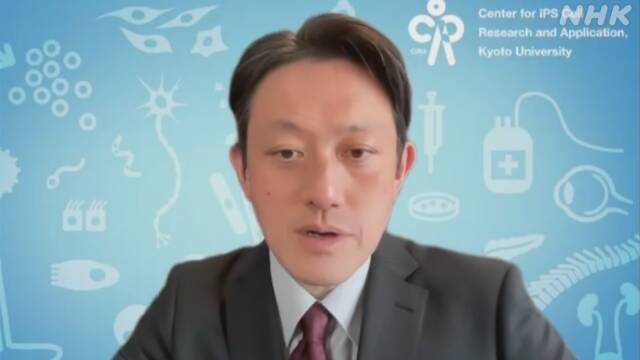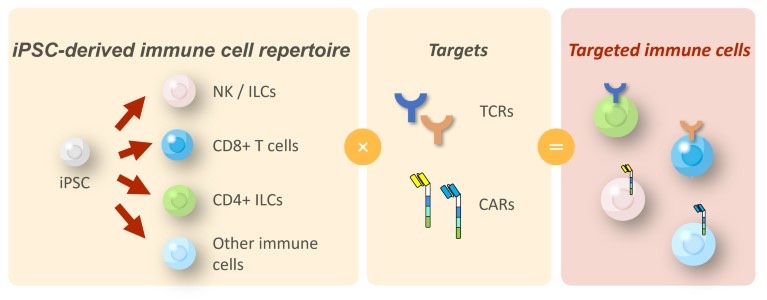

Immune cells: 「iPS細胞で作製」に成功!
“faire avec des cellules iPS” !
„Machen mit iPS-Zellen“ gelungen!
“making with iPS cells”!
免疫細胞:“用iPS細胞製造”成功!
ーiPSを使い、がん免疫療法・免疫細胞を作製ー
京都大学:
ー免疫細胞をiPS細胞で作製ー
「がん免疫療法で使われる免疫細胞」について、
「iPS細胞を使って、がん攻撃力を人工的に高める」のに成功した。
「免疫細胞をiPS細胞から作り出す実験」に成功した。
京都大学などの研究グループが発表しました。
低コストで患者に提供:
iPS細胞から効率的に作ることで、
低いコストで多くの患者に、提供できるようになる。
京都大学
iPS細胞研究所
金子新教授ー京都大学iPS細胞研究所の金子新教授などの研究グループー
オンラインで記者会見を開いて発表しました。
「CAR-T細胞療法」:
血液のがんの患者を対象にした免疫療法の1つ「CAR-T細胞療法」
患者の免疫細胞をいったん体の外に出して、
がん攻撃力を高める遺伝子を組込んだ後、体内に戻してがんを攻撃させます。
iPSから免疫細胞を作製:
グループでは、患者の細胞の代わりにiPS細胞から免疫細胞を作り出しました。
人工的に強化したうえで、がんを移植したマウスに投与しました。
その結果、
投与したマウスでは、
がんが大きくなるのを抑える効果が、確認されたとのこと。
NHK | 医療・健康
https://www3.nhk.or.jp/news/html/20221213/k10013920961000.html
京都大:固形がんを抑制する細胞作製
ーマウスでiPS細胞を活用ー
iPS細胞研究所:
京都大iPS細胞研究所の研究グループが発表した。
iPS細胞を使い、「マウスで固形がんの増大を抑制するリンパ球・T細胞」を作製した。
免疫療法では、血液がんより難易度が高い固形がんの治療への応用が期待されるという。
この論文:
12月13日、
ネイチャー・バイオメディカル・エンジニアリング電子版に掲載された。
研究チーム:
「がんを攻撃する機能を活性化する人工的なタンパク質を持つT細胞」を、
iPS細胞から作製した。
通常のT細胞と同じ効果を発現させるため、
攻撃する機能を妨げる遺伝子を除去するとともに、
攻撃する機能の活性化を促す遺伝子を導入した。
京都大(時事通信) – Yahoo!ニュース
https://news.yahoo.co.jp/articles/33d4ba1a928823a0fda37967f7d8c4b8e6d283c5
Cellules immunitaires : Réussir le “faire avec des cellules iPS” !
-Utiliser iPS pour créer une immunothérapie contre le cancer et des cellules immunitaires-
Université de Kyôto :
-Cellules immunitaires générées à partir de cellules iPS-
À propos des “cellules immunitaires utilisées dans l’immunothérapie du cancer”
A réussi à “améliorer artificiellement la puissance d’attaque du cancer à l’aide de cellules iPS”.
A réussi une expérience pour créer des cellules immunitaires à partir de cellules iPS.
Des groupes de recherche tels que l’Université de Kyoto ont fait une présentation.
Faible coût pour les patients :
En produisant efficacement à partir de cellules iPS,
Il peut être fourni à de nombreux patients à un faible coût.
Université de Kyoto
Institut de recherche sur les cellules iPS
Nouveau Professeur Kaneko
– Un groupe de recherche dirigé par le Professeur Arata Kaneko du Center for iPS Cell Research and Application, Kyoto University –
Nous avons tenu une conférence de presse en ligne pour l’annoncer.
“Thérapie cellulaire CAR-T”:
La thérapie cellulaire CAR-T, une des immunothérapies pour les patients atteints de cancer du sang
Une fois que les cellules immunitaires du patient sont retirées du corps,
Après avoir incorporé un gène qui améliore la puissance d’attaque du cancer, il est renvoyé dans le corps pour attaquer le cancer.
Générer des cellules immunitaires à partir d’iPS :
Le groupe a créé des cellules immunitaires à partir de cellules iPS au lieu de cellules de patients.
Après avoir été renforcé artificiellement, il a été administré à des souris implantées d’un cancer.
par conséquent,
Chez les souris traitées,
L’effet de suppression de la croissance du cancer a été confirmé.
NHK | Médical/Santé
Université de Kyoto : Production de cellules qui suppriment les tumeurs solides
-Utilisation des cellules iPS chez la souris-
Institut de recherche sur les cellules iPS :
Un groupe de recherche de l’Institut de recherche sur les cellules iPS de l’Université de Kyoto a fait une présentation.
En utilisant des cellules iPS, nous avons créé “des lymphocytes et des cellules T qui suppriment la croissance des tumeurs solides chez la souris”.
L’immunothérapie devrait être appliquée au traitement des cancers solides, plus difficiles que les cancers du sang.
Ce papier:
13 décembre,
Publié dans Nature Biomedical Engineering Electronic Edition.
L’équipe de recherche:
“Cellules T avec des protéines artificielles qui activent la fonction d’attaque du cancer”
Produit à partir de cellules iPS.
Afin d’exprimer le même effet que les lymphocytes T normaux,
En plus de supprimer les gènes qui interfèrent avec la capacité d’attaquer,
Un gène a été introduit qui favorise l’activation de la fonction d’attaque.
Université de Kyoto (Jiji Press) – Yahoo! Actualités
Immunzellen: „Machen mit iPS-Zellen“ gelungen!
-Verwendung von iPS zur Herstellung von Krebsimmuntherapien und Immunzellen-
Universität Kyoto:
-Aus iPS-Zellen generierte Immunzellen-
Über „Immunzellen in der Krebsimmuntherapie“
Erfolgreich bei der „künstlichen Steigerung der Angriffskraft von Krebs mithilfe von iPS-Zellen“.
Es gelang in einem Experiment, Immunzellen aus iPS-Zellen zu erzeugen.
Forschungsgruppen wie die Universität Kyoto hielten eine Präsentation.
Niedrige Kosten für Patienten:
Durch die effiziente Produktion aus iPS-Zellen
Es kann vielen Patienten kostengünstig zur Verfügung gestellt werden.
Universität Kyoto
iPS-Zellforschungsinstitut
Neuer Professor Kaneko
– Eine Forschungsgruppe unter der Leitung von Professor Arata Kaneko vom Center for iPS Cell Research and Application, Kyoto University –
Wir haben eine Online-Pressekonferenz abgehalten, um dies bekannt zu geben.
“CAR-T-Zelltherapie”:
CAR-T-Zelltherapie, eine der Immuntherapien für Blutkrebspatienten
Sobald die Immunzellen des Patienten aus dem Körper entfernt wurden,
Nach dem Einbau eines Gens, das die Angriffskraft von Krebs erhöht, wird es an den Körper zurückgegeben, um Krebs anzugreifen.
Immunzellen aus iPS generieren:
Die Gruppe erzeugte Immunzellen aus iPS-Zellen anstelle von Patientenzellen.
Nachdem es künstlich verstärkt worden war, wurde es Mäusen verabreicht, denen Krebs eingepflanzt worden war.
als Ergebnis,
Bei behandelten Mäusen
Die Wirkung der Unterdrückung des Krebswachstums wurde bestätigt.
NHK | Medizin/Gesundheit
Universität Kyoto: Produktion von Zellen, die solide Tumore unterdrücken
-Verwendung von iPS-Zellen in Mäusen-
iPS-Zellforschungsinstitut:
Eine Forschungsgruppe am iPS Cell Research Institute der Universität Kyoto hielt eine Präsentation.
Unter Verwendung von iPS-Zellen schufen wir „Lymphozyten und T-Zellen, die das Wachstum von soliden Tumoren in Mäusen unterdrücken“.
Es wird erwartet, dass die Immuntherapie bei der Behandlung von soliden Krebserkrankungen angewendet wird, die schwieriger sind als Blutkrebs.
Dieses Papier:
13. Dezember,
Veröffentlicht in Nature Biomedical Engineering Electronic Edition.
Forschungsgruppe:
“T-Zellen mit künstlichen Proteinen, die die Funktion aktivieren, Krebs anzugreifen”
Hergestellt aus iPS-Zellen.
Um die gleiche Wirkung wie normale T-Zellen auszudrücken,
Zusammen mit der Entfernung der Gene, die die Angriffsfähigkeit beeinträchtigen,
Ein Gen wurde eingeführt, das die Aktivierung der Angriffsfunktion fördert.
Universität Kyoto (Jiji Press) – Yahoo!-Nachrichten
Japanese researchers find efficient way to create immune cells from iPS cells
NHK WORLD-JAPAN News
Japanese researchers say
they have created artificially enhanced immune cells from iPS cells for use in immunotherapy cancer treatment.
A group led by Professor Kaneko Shin at Kyoto University’s Center for iPS cell Research and Application
made the announcement Monday at an online news conference.
In current chimeric antigen receptor-T, or CAR-T, immunotherapy for blood cancer patients, immune cells
are removed from the patients, genetically modified to boost their ability to attack cancer cells, and then returned to the patients.
The researchers say
they derived the immune cells from induced pluripotent stem cells rather than from the patients’ cells.
They artificially enhanced
the anti-cancer properties of the iPS-derived immune cells and infused them into mice implanted with cancer cells.
Kaneko’s team said
the treatment effectively prevented the cancer cells’ growth.
The researchers noted their method costs less than the current CAR-T therapy.
They said
it enables them to create immune cells efficiently from iPS cells at a lower cost that can then be used for many patients.
Kaneko said
new immunotherapies can be developed by combining his method with existing therapies, such as those using anti-cancer drugs.
https://www3.nhk.or.jp/nhkworld/en/news/20221213_07/
Leading the next wave of cancer
immune-cell therapies via allogeneic iPS-Ts Cancer immune-cell therapies are increasing in prominence as breakthrough treatments.
Since 2017,
several chimeric antigen receptor (CAR) T-cell therapies have been approved and have demonstrated excellent therapeutic efficacy in haematologic malignancies.
All of the currently approved CAR T-cell therapies are patient-derived,
and they face two major challenges: variability in the quality and quantity of produced cells; and insufficient efficacy due to cell exhaustion.
The potential use of allogeneic induced pluripotent stem cell (iPSC)-derived T cells (iPS-Ts)
is therefore attracting attention for the stable production and rejuvenation of manufactured immune cells.
Founded in 2015,
Thyas is a Kyoto University spinoff whose research and development
is focused on the clinical application of iPSC-derived immune cells, based on the research advances made by Shin Kaneko at the Centre for iPS Cell Research and Application (CiRA) in Japan.
In 2013, Kaneko — the founder of Thyas —
was the first scientist to accomplish T-cell differentiation from human iPSCs, and to demonstrate in vitro and in vivo efficacy.
Thyas is pioneering immune-cell therapies using iPSCs as an allogeneic source for the treatment of oncological and non-oncological clinical indications.
Its platform technologies
enable Thyas to consistently produce energized immune cells, especially cluster of differentiation 8 (CD8)-α and CD8-β T cells, for clinical studies (Fig. 1).